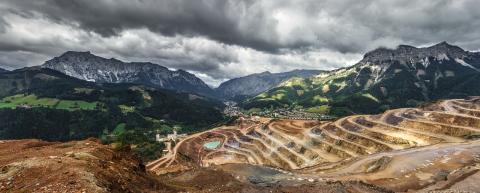
The Securities and Exchange Commission (SEC) released a long-awaited new rule on Section 1504 of the Dodd-Frank Wall Street Reform and Consumer Protection Act passed in 2010.
This rule requires the disclosure of payments made to both the federal and foreign governments by oil, gas, and mining companies listed on U.S. stock exchanges. Rules released in 2012 by the SEC were struck down in 2013 following a lawsuit by the American Petroleum Institute.
“In his encyclical, Laudato Si', Pope Francis highlighted the relationship between environmental degradation and extreme poverty. He recognized that corruption often hinders efforts to protect creation and lift the most vulnerable out of poverty,” said Chloe Schwabe, Faith Economy Ecology Project Coordinator at the Maryknoll Office for Global Concerns.
“Our missioners in Asia, Africa, and Latin America witness both the failure to alleviate poverty and the poor stewardship of revenue in countries with tremendous resource wealth,” Schwabe said. “These new rules are critical for addressing the rampant corruption that exists between extractive industries and governments, and to ensuring that natural resource wealth actually serves the common good rather than the pockets of a few.”
“While resource extraction is not a sustainable model of development for creation or the most vulnerable, we believe that when oil, gas, and minerals are exploited that wealth must be allocated to programs and agencies that lift the most vulnerable out of poverty, especially those directly impacted by the project.”
Maryknoll Office for Global Concerns applauds that the reporting will be at the project level to maximize transparency and accountability. “Today we celebrate that our federal regulators stood up to pressure from oil, gas, and mining companies by requiring reporting of payments at the project level. This is the level of granularity that will best serve communities directly affected by projects that can cause loss of livelihoods, territory, dignity and life,” Schwabe said.
But the rule does fall short in some areas. “Unfortunately, this rule allows a one-year delay in reporting on year-one exploration activities, allowing some corruption to remain in the dark,” Schwabe said.
Companies will also not need to begin compliance until 2018, which means first reports may not be released until early 2019. “Unfortunately we will not see swift implementation of the rules for a few years, even as Canada and the European Union charge ahead,” Schwabe said. “While in 2010 the U.S. was a leader in natural resource revenue transparency, the obstacles and foot-dragging by both industry and the S.E.C. have held us back. We look forward to the U.S. joining others in the international community to finally address the resource curse.”
